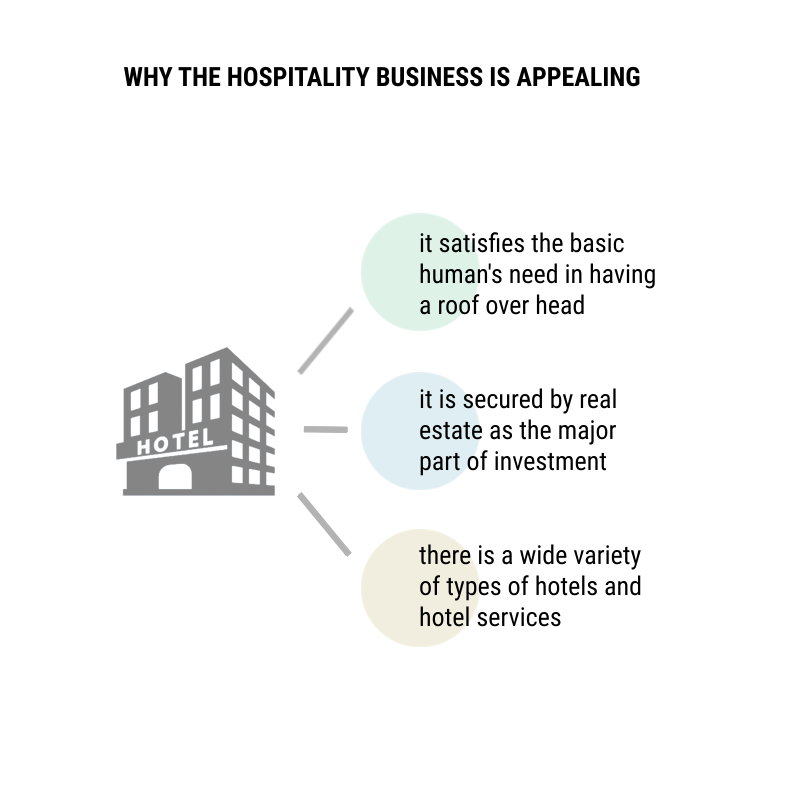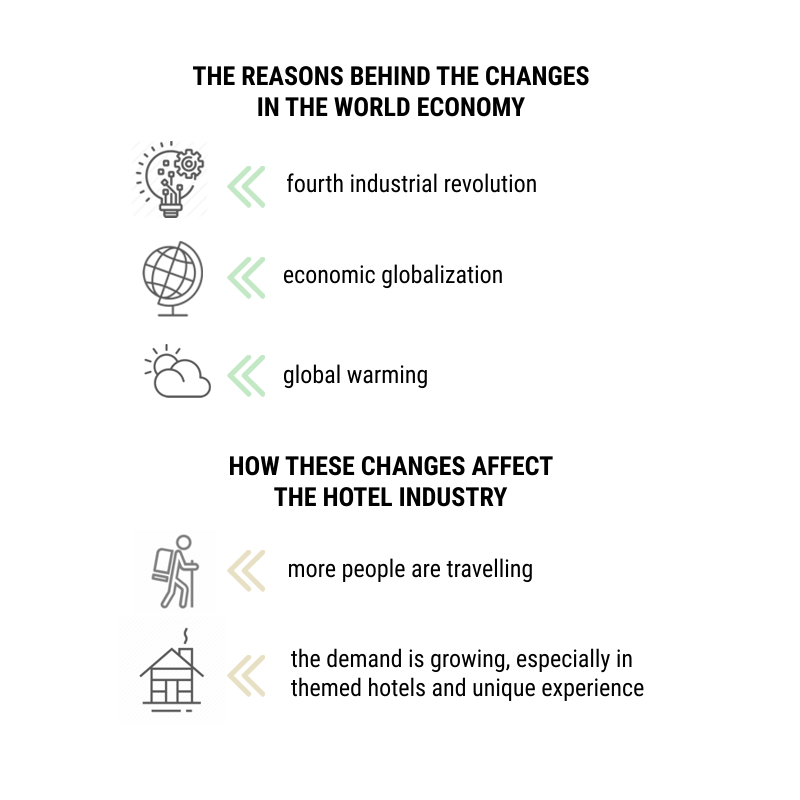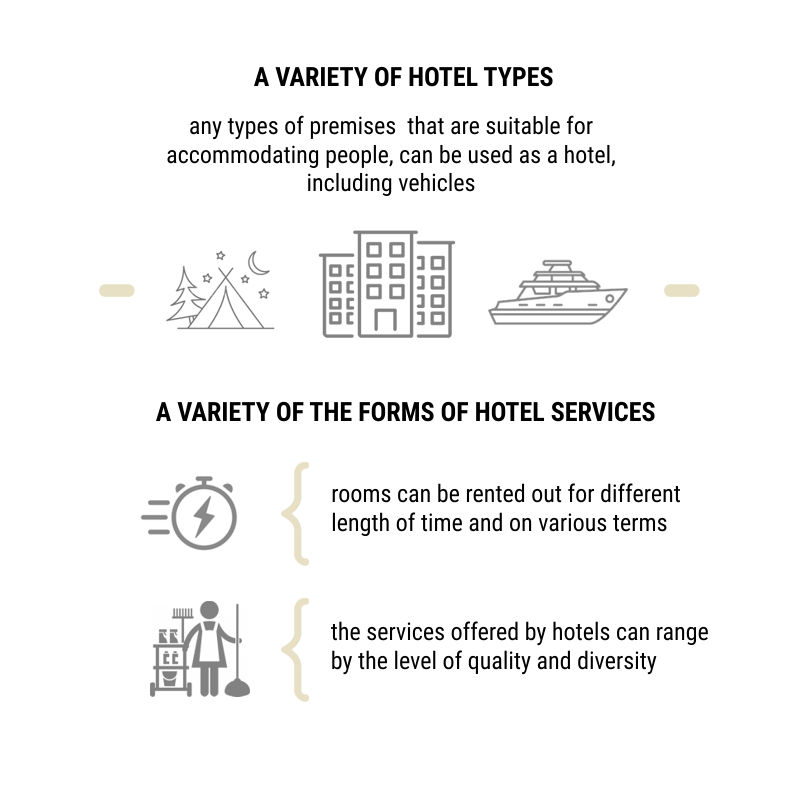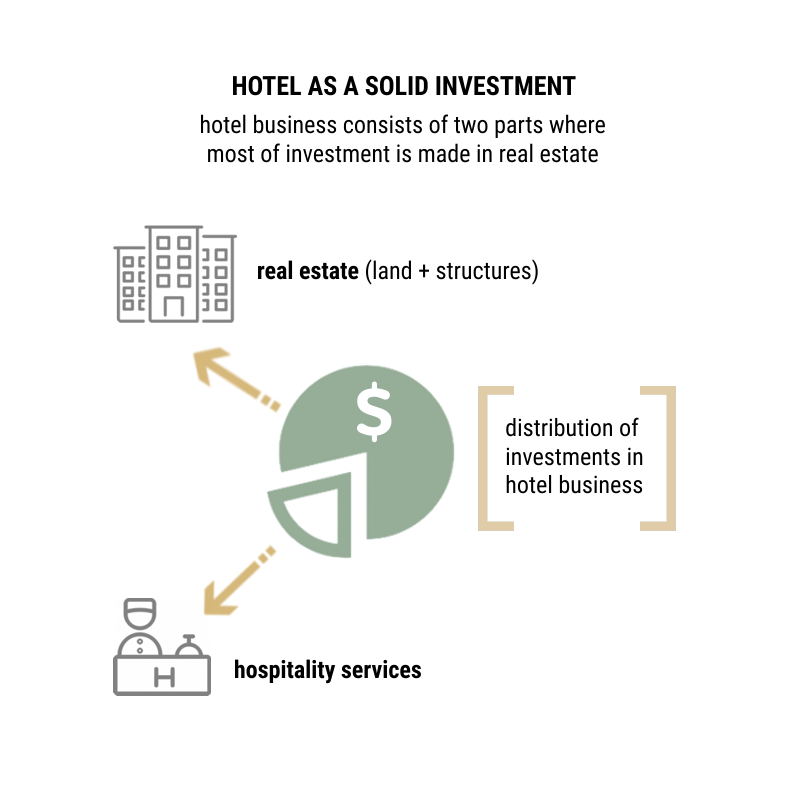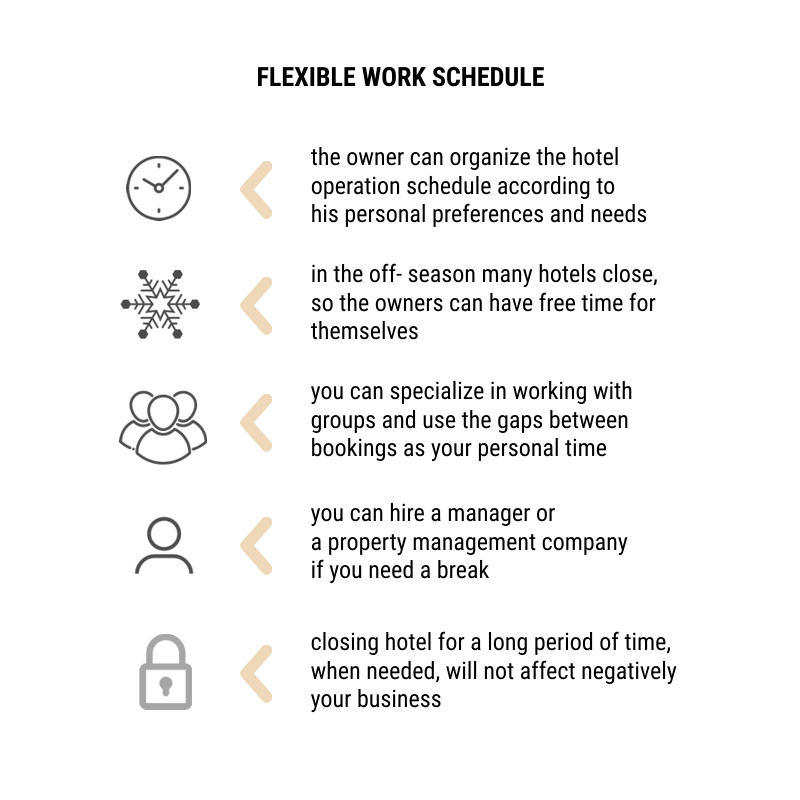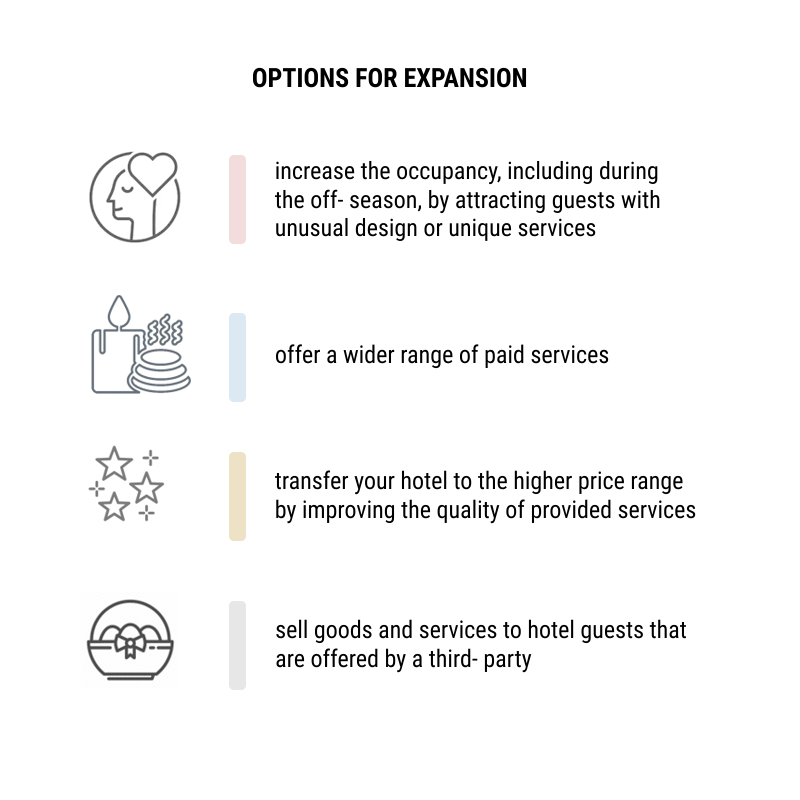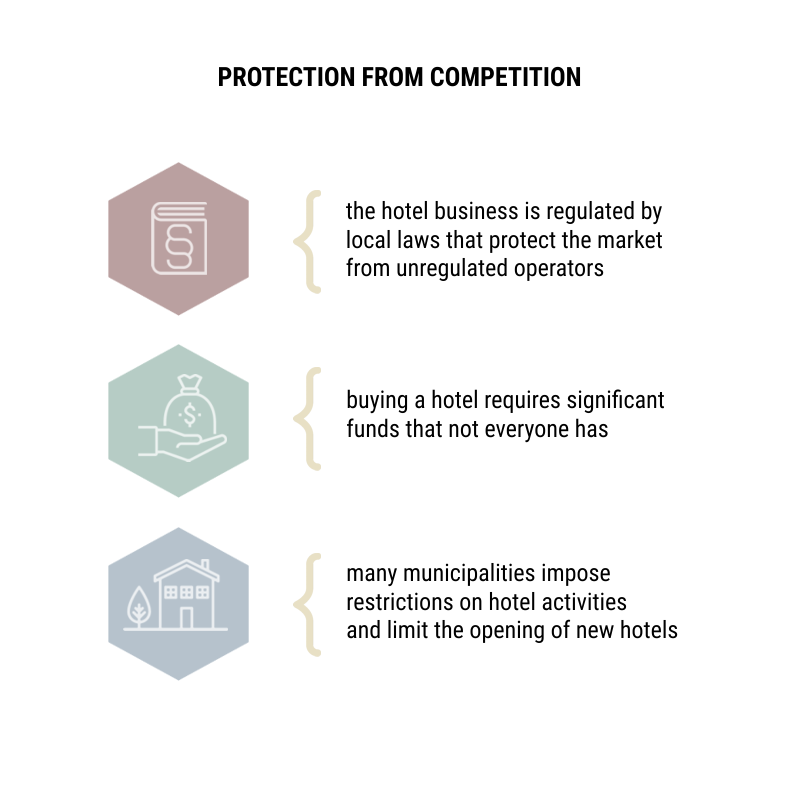 slides |
 main |
 prev |
 next |
▸ The prospects of hotel industry ▸ Variety of forms and approaches ▸ Hotel as a solid investment ▸ Flexible work schedule ▸ Options for expansion ▸ Protection from competition |
When it comes to searching for a reliable business, the hotel industry is a good choice. There is a number of reasons for that, such as:
The prospects of hotel industry
When you run a business, you always carry certain risk. In order to reduce the risk and make your business successful, certain factors should be in place, such as:
There are many more factors that affect the success of a business. However, you should always start with assessment of the prospects of the chosen field. The questions you should ask include: How stable is this type of business in general? What awaits it in the future and what problems will you have to deal with? The answers will affect your decision regarding whether the selected business worth pursuing. The hotel industry is no exception.
When making such assessment, you need to understand the complexity of the current moment. The world economy is coming through the phase of deep transformation. There are three major factors that define this process. Each of them is capable of causing tectonic changes, but since they are working simultaneously, the effect is going to be even more profound.
1) the fourth industrial revolution, which is defined as a transition to full automation of production processes and service industry. This automation is controlled by the real-time artificial intelligence systems integrated into a unified communication network. All this happens through the expansion of communication technologies, development of artificial intelligence systems, and, most importantly, replacement of people in the production and service sectors with robots and virtual assistants.
As a result, many professions are becoming obsolete, offices and retail stores are closing, the service sector and the trades are moving online, people in production and other areas are replaced by robots and computerized systems.
2) economic globalization, which in essence is a distribution of production and industries between regions in order to make a better use of local advantages and reduce unnecessary costs. The result of this globalization, among other things, is an increase in living standards in the third-world countries and in general, an equalization of incomes around the world. This causes the greater number of people who can afford to travel, changes the ways of travelling, as well as the purposes and destinations.
3) global warming and related environmental concerns. Climate awareness is becoming a defining factor that makes people change their travel and vacation preferences, explore new places, and avoid certain previously popular destinations. It also affects the ways of how people travel and how they prefer spending their holidays.
Undoubtedly, such transformations have a great affect on the hospitality industry. But the good thing is that the very core of hotel business stays unchanged. Having a roof over your head is one of the basic human's needs, like food and clothing, including when people are travelling.
Given that people will never stop travelling, and that during their trips they need a place to stay, which cannot be replaced by any virtual services, the demand for hotels will always exist.
Therefore, the provision of accommodation services, with the right strategy and adaptation, will continue being a potentially profitable business with good prospects.
Variety of forms and approaches
One of the appealing aspects of the hotel business is that the types and the forms of accommodation services can be very diverse. However, what really matters for a traveler is having a roof over his head, everything else, like how this is done and in what form, is inessential.
Let's analyze the very basic needs of a traveller. For example, he is going to spend a night in a tent or a self-made shelter. What will he need?
In addition to that, the place should be safe so that no one steals his belongings, attacks him or drives him away, and the tent or shelter should protect him in bad weather. Therefore, even providing such a basic place in exchange for a payment (in fact, we have here a classic case of renting out a place) can already be considered the simplest form of hotel services.
Taking into account that you can rent out almost everything that can be used as a shelter, it explains a variety of types of hotels - from classic city hotels to country cottages, farmhouses, campsites, floating hotels, motor homes, and so on. Practically, any place where a person can spend a night is considered suitable for using as a hotel - unless, of course, it is not allowed by local legislation.
There are also different ways of how hotels sell their rooms. The most common practice is selling rooms on a "per night" basis. However, this is not the only option.
There are quite a lot of situations when people need a place for just a few hours - for example, to take a break, clean up and change, leave their belongings, meet someone, or work. Also quite often people need a hotel to stay for a longer term, up to several months. Some hotels prefer to deal with groups, selling them all rooms in a batch for a certain period of time.
Additionally, the form and the range of services provided to guests can vary depending on the hotel concept and service standards, from occasional room cleaning to the full-range concierge service.
Therefore, when you choose a concept for your hotel, including the type of guests you are going to target, and the level of services you plan to provide, you should take into account the following two most important points:
The possibility of applying such a flexible approach and using creative solutions allows the small hotel owners:
That is why the small hotel business is so attractive to many people.
Hotel as a solid investment
In most cases, the major part of hotel business consists of real estate, such as buildings and land. Which is obvious, as by its very nature, the hotel industry includes renting out rooms, premises and common spaces on a short-term basis.
It is a common knowledge that buying real estate properties is one of the most secure ways of investment. Hotel property is no exception. Real estate is always in demand, and its value usually only appreciates over time. Although it is not considered a high liquid commodity per se, if bought in the right location it can be sold relatively easy. Therefore, when you own a real estate property, you can always convert it into cash either through selling or through taking a loan against it.
When it comes to estimating the total value of a hotel, the following two main components should be taken into account :
Obviously, the better you manage your business and the more income you get, the higher is your business evaluation. If the business is not doing well, then its value declines.
At the same time, the value of the real estate component is not affected much by the fact whether your business is successful or not. The property prices are mostly determined by such factors as the state of the local economy, the demand for real estate in the area, the current supply, and so on. And even when some fluctuations occur on the real estate market, normally they are not too big and do not affect significantly the value of properties. Usually these dynamics (up or down) keep within the rate of inflation, or deflation.
Therefore, having a real estate as the major part of your enterprise, is a distinctive feature of the hotel business, which separates it from other types of businesses. It means that even if you fail as a small hotel owner, you can always recover your investment (at least, the larger part of it) by selling your hotel as a real estate property.
This fact makes buying a hotel a reliable investment, and this is only one of many other advantages of owning a small hotel.
Flexible work schedule
Another great advantage of the small hotel business is that its owner can adapt the hotel operation schedule to his personal preferences and lifestyle. Of course, if your goal is getting maximum profit, and running a hotel is your main priority, then you need to invest all your time and energy into this.
However, there are many owners of small hotels who would rather have more free time than maximize the profit. For example, small hotels are often owned by retirees who see this business as an additional source of income, but not as a full-time job.
For many prospective buyers, the purpose of owning a small hotel is having an opportunity to live in a nice place and, at the same time, earning some income, which would, at least partially, cover their living expenses. This type of owners would prefer to have enough time for travelling or doing any other favorite activities. Therefore, they organize their hotel operation in such a manner that it is built around their lifestyle.
A similar situation is with another category of small hotel owners, freelancers. Their main source of income comes from their professional activities, and owning a small hotel is like having a safety net and an additional source of stable income. Due to the nature of their professions they are not always overloaded with work, thus they have the ability and the time to look after this business. However, they also have to arrange the hotel operations taking into account their workload.
Luckily for the owners who need free time, many hotels do not require a year-round operation. For instance, in many places hotel business is seasonal, which makes it possible to close the hotel for a pretty long period of time without significant losses. There are certain regions where an influx of tourists happens only during the summer time. And after the high season passes, many hotel owners close the doors. Usually, the income received during the high season is enough to cover expenses for the entire year. This gives the owners flexibility in managing their time.
Another option of having free time for yourself, is owning a hotel that specializes in working with groups. There are hotels that provide services to large groups of guests and cater events, such as weddings, business conferences, seminars, etc. And because there are usually gaps between arrivals of groups, you can use them as your own free time.
There is one more advantage of the small hotel business that separates it from other businesses. If, for some reason, you need to close a hotel for a prolonged period of time, this closure will not cause irreversible consequences.
Others would lose their customers and would be out of business if they close for several months or more. After they open again, probably only a small fraction of former customers would return, which for most businesses would be a disaster.
But when you own a small hotel, the situation is completely different. According to statistics, the percentage of returning customers in this case is very low. Usually people who stay in small hotels select and book these places right before the trip. Their choice is based on available vacancies, price, location and the range of provided services.
Therefore, you can close your hotel for a long time without much concern. For example, when you have to close for health reasons, or if you want to do renovations, or you just need a break. Of course you will not be earning any money during such closure, but at least you will not lose your business. You can always get back into the game.
All this allows the owners of small hotels to build their own work schedule, that would be convenient for them and can be incorporated into their lifestyle, so that they would not be constantly tied up by this business.
Finally, there are certain options for running a hotel business that require minimal involvement of the owners. For example, when renting premises for a long time, or if you hire a property management company, which would take care of everything, and so on.
Options for expansion
The hotel business has traditionally been regarded as merely providing a short-term accommodation. However, along with the transformations that are happening in our society, the hotel industry is also changing, it is becoming more complex and diverse.
Although accommodation continues to be the core of the hospitality business, the types and forms of provided services start playing a more significant role. The new trends have opened up the possibilities for developing the more sophisticated business models and creating new sources of additional income.
In order to better understand what is happening in the hospitality industry, let's start with looking into the history.
The service of providing accommodation to other people has been existed since ancient times. It started from owners letting strangers to stay and sleep in their houses in exchange for money. That is, the owner of the house was selling a place under his roof to other people to satisfy their basic needs. The hotel services at that stage could be characterized as a commodity.
Then the accommodation services had developed into a separate industry. People started building facilities specifically allocated for the provision of an overnight accommodation. Hotel services at this stage had become a product since the hotel owner was selling such goods as lodging for a certain period of time.
The next step in the hotel business evolution was adding services that made the stay for their guests more comfortable and enjoyable. For example, hotels started to offer business travellers such services as the use of conference rooms, printers and fax machines, etc. To accommodate the needs of vacationers, hotels had added swimming pools, spa services, and offered help with booking tickets to theaters, etc. As a result, hotel business has transformed from a simple product into a comprehensive service. This is the current state of the hospitality industry.
Now we are moving to the next level of development of this industry, heading in the direction of providing guests with memorable experiences. For instance, hotels started attracting guests with an unusual design, or an expanded range of services, or with some interesting events, and so on. Good examples are ice hotels in the North, or staying in Berber tents in a desert.
In this regard, a creative approach plays an increasingly important role, especially if you have to compete with large hotel chains. A creative approach allows the small hotel owners attract more guests and increase their profit not only through a wider range of services, but through turning their hotel into a unique destination by itself.
For example, you can offer cooking classes using your hotel's facilities or cooperating with a nearby restaurant. Hosting such events would help you attract people during the low season and could become a source of extra income.
In fact, such things like organizing training and classes, providing unusual entertainment, or offering something, that people would want to come to your hotel for, is now the mainstream of the small hotel business development. Travellers want to participate in something meaningful or unconventional, therefore, they start to appreciate the uniqueness of their travel experience above all else.
In that regard, despite the fact that the hotel's revenue is limited by the number of rooms, a creative approach can help raise income by increasing occupancy during the low seasons, or by raising room prices due to provision of unique services. You can also enhance revenues by expanding the range of paid services that could interest your guests - for example, providing spa services or offering yoga classes.
Examples of options when you can charge higher room rates, could be providing your guests with such unique experiences like participating in a carnival, or taking part in a movie shooting, that you have organized. There is also an option of renting out rooms per hour instead of per night. For instance, in Japan there are love hotels that offer rooms for short periods of time.
The use of the adjacent territory could be also a good source for added revenue. For example, you can fence off a piece of land for a dog park, in order to attract people travelling with their pets. Or you can set aside the territory for organizing glamping, if you have enough space for that.
In sum, the possibilities can be endless. Besides, keep in mind that your guests are the clients who have already come to you, which means you have a ready pool of consumers. So, in addition to hotel services, you can provide them with a wide variety of other goods and services, including services arranged by a third party.
As you can see, there is a ton of options for further development of your hotel business and for earning more profit, when you own a small hotel. All you need is a creative approach and thinking outside the box.
Protection from competition
Almost everywhere, the hotel business is regulated by local laws, as it is one of the largest sectors of economy. The government's task is protecting the hotel services market from unregulated operators, and it always takes measures to thwart such activities.
There are many rules and requirements that regulate the hotel industry. The government requires that hotels should provide guests with a certain level of safety and comfort. These rules and requirements usually are very strict, and hard to follow for those to whom providing accommodation is not a full-time business. In fact, this plays in favor of legitimate hospitality establishments such as hotels and lodges, as it protects them from too much competition. This competition includes individual home owners who rent out their properties through such systems like AirBnB. As they too have to follow the strict rules of the hotel industry, not everyone is capable to meet these rules.
Then, there is another challenge. Getting into the hotel business requires significant funds, which can be sourced either from personal savings or by obtaining a loan. Again, not everyone has such possibilities, therefore, this serves as a natural barrier that prevents from been surrounded by excessive competition.
On top of that, there are many local restrictions imposed on the hotel activities, such as zoning and by-laws, mandatory requirements for obtaining permits and licenses. This also cuts off those who is not capable or willing to overcome such challenges and leaves you with less competition.
In many regions where the hotel industry is well developed, opening a new hotel is sometimes extremely difficult. Usually, there are more strict requirements imposed on new hotels, which local municipalities use to regulate the number of hotels in order to avoid too much competition. In such areas, it is usually recommended to buy an existing hotel rather than build a new one.
Also it is worth mentioning the problems created by AirBnB. Undoubtedly, at first it took the hotel industry by surprise, but by today the impact of this problem has been significantly reduced. First, in many regions, the local municipalities have imposed restrictions on the use of private properties, such as houses and apartments, for short-term rentals, or have even banned this practice. And, apparently, these rules will only be tightened. Secondly, people became more cautious to renting a private property for a short term due to numerous cases of fraud and misleading information by hosts. Already, many of previously active users of AirBnB have started booking hotels instead.
Finally, small hotels themselves have joined the Airbnb system for booking their rooms, which leads to transformation of this platform.
Therefore, as the decades of the previous history have proved, the hotel industry is still in good shape, and the local governing authorities actively protect it from competition, which is another significant advantage of owning a small hotel.
★
stable high demand in hotel services. The necessity of having a roof over your head, including when you are traveling, is one of human's basic needs.
★
reliability of investing in hotels. Due to the fact that the main component of hotel business is real estate, the value of which usually only appreciates over time, such investments are well protected.
★
diversity of types of hotels and forms of services. The variety of accommodation options allows you find your niche and use your competitive advantage for increasing your profit.
★
a wide range of options for generating additional income. Hotel guests are a perfect target audience, which you can provide with a range of additional services and goods.
The prospects of hotel industry
When you run a business, you always carry certain risk. In order to reduce the risk and make your business successful, certain factors should be in place, such as:
★
favorable conditions for conducting a certain type of business;
★
sustainability and predictability of this business;
★
good prospects for its development;
★
possession of certain knowledge and skills;
★
availability of sufficient funding.
When making such assessment, you need to understand the complexity of the current moment. The world economy is coming through the phase of deep transformation. There are three major factors that define this process. Each of them is capable of causing tectonic changes, but since they are working simultaneously, the effect is going to be even more profound.
1) the fourth industrial revolution, which is defined as a transition to full automation of production processes and service industry. This automation is controlled by the real-time artificial intelligence systems integrated into a unified communication network. All this happens through the expansion of communication technologies, development of artificial intelligence systems, and, most importantly, replacement of people in the production and service sectors with robots and virtual assistants.
As a result, many professions are becoming obsolete, offices and retail stores are closing, the service sector and the trades are moving online, people in production and other areas are replaced by robots and computerized systems.
2) economic globalization, which in essence is a distribution of production and industries between regions in order to make a better use of local advantages and reduce unnecessary costs. The result of this globalization, among other things, is an increase in living standards in the third-world countries and in general, an equalization of incomes around the world. This causes the greater number of people who can afford to travel, changes the ways of travelling, as well as the purposes and destinations.
3) global warming and related environmental concerns. Climate awareness is becoming a defining factor that makes people change their travel and vacation preferences, explore new places, and avoid certain previously popular destinations. It also affects the ways of how people travel and how they prefer spending their holidays.
Undoubtedly, such transformations have a great affect on the hospitality industry. But the good thing is that the very core of hotel business stays unchanged. Having a roof over your head is one of the basic human's needs, like food and clothing, including when people are travelling.
Given that people will never stop travelling, and that during their trips they need a place to stay, which cannot be replaced by any virtual services, the demand for hotels will always exist.
Therefore, the provision of accommodation services, with the right strategy and adaptation, will continue being a potentially profitable business with good prospects.
Variety of forms and approaches
One of the appealing aspects of the hotel business is that the types and the forms of accommodation services can be very diverse. However, what really matters for a traveler is having a roof over his head, everything else, like how this is done and in what form, is inessential.
Let's analyze the very basic needs of a traveller. For example, he is going to spend a night in a tent or a self-made shelter. What will he need?
★
the land on which he can put up a tent or build a shelter;
★
a place for taking care of his basic hygiene needs;
★
a place for cooking the food.
Taking into account that you can rent out almost everything that can be used as a shelter, it explains a variety of types of hotels - from classic city hotels to country cottages, farmhouses, campsites, floating hotels, motor homes, and so on. Practically, any place where a person can spend a night is considered suitable for using as a hotel - unless, of course, it is not allowed by local legislation.
There are also different ways of how hotels sell their rooms. The most common practice is selling rooms on a "per night" basis. However, this is not the only option.
There are quite a lot of situations when people need a place for just a few hours - for example, to take a break, clean up and change, leave their belongings, meet someone, or work. Also quite often people need a hotel to stay for a longer term, up to several months. Some hotels prefer to deal with groups, selling them all rooms in a batch for a certain period of time.
Additionally, the form and the range of services provided to guests can vary depending on the hotel concept and service standards, from occasional room cleaning to the full-range concierge service.
Therefore, when you choose a concept for your hotel, including the type of guests you are going to target, and the level of services you plan to provide, you should take into account the following two most important points:
★
which option will result in more profit to your hotel;
★
your personal preferences and capabilities.
★
quickly adapt to changing circumstances and emerging demand; and
★
build this business around their lifestyle, taking into account their preferences and plans.
Hotel as a solid investment
In most cases, the major part of hotel business consists of real estate, such as buildings and land. Which is obvious, as by its very nature, the hotel industry includes renting out rooms, premises and common spaces on a short-term basis.
It is a common knowledge that buying real estate properties is one of the most secure ways of investment. Hotel property is no exception. Real estate is always in demand, and its value usually only appreciates over time. Although it is not considered a high liquid commodity per se, if bought in the right location it can be sold relatively easy. Therefore, when you own a real estate property, you can always convert it into cash either through selling or through taking a loan against it.
When it comes to estimating the total value of a hotel, the following two main components should be taken into account :
★
the value of buildings and land;
★
the value of the business itself.
At the same time, the value of the real estate component is not affected much by the fact whether your business is successful or not. The property prices are mostly determined by such factors as the state of the local economy, the demand for real estate in the area, the current supply, and so on. And even when some fluctuations occur on the real estate market, normally they are not too big and do not affect significantly the value of properties. Usually these dynamics (up or down) keep within the rate of inflation, or deflation.
Therefore, having a real estate as the major part of your enterprise, is a distinctive feature of the hotel business, which separates it from other types of businesses. It means that even if you fail as a small hotel owner, you can always recover your investment (at least, the larger part of it) by selling your hotel as a real estate property.
This fact makes buying a hotel a reliable investment, and this is only one of many other advantages of owning a small hotel.
Flexible work schedule
Another great advantage of the small hotel business is that its owner can adapt the hotel operation schedule to his personal preferences and lifestyle. Of course, if your goal is getting maximum profit, and running a hotel is your main priority, then you need to invest all your time and energy into this.
However, there are many owners of small hotels who would rather have more free time than maximize the profit. For example, small hotels are often owned by retirees who see this business as an additional source of income, but not as a full-time job.
For many prospective buyers, the purpose of owning a small hotel is having an opportunity to live in a nice place and, at the same time, earning some income, which would, at least partially, cover their living expenses. This type of owners would prefer to have enough time for travelling or doing any other favorite activities. Therefore, they organize their hotel operation in such a manner that it is built around their lifestyle.
A similar situation is with another category of small hotel owners, freelancers. Their main source of income comes from their professional activities, and owning a small hotel is like having a safety net and an additional source of stable income. Due to the nature of their professions they are not always overloaded with work, thus they have the ability and the time to look after this business. However, they also have to arrange the hotel operations taking into account their workload.
Luckily for the owners who need free time, many hotels do not require a year-round operation. For instance, in many places hotel business is seasonal, which makes it possible to close the hotel for a pretty long period of time without significant losses. There are certain regions where an influx of tourists happens only during the summer time. And after the high season passes, many hotel owners close the doors. Usually, the income received during the high season is enough to cover expenses for the entire year. This gives the owners flexibility in managing their time.
Another option of having free time for yourself, is owning a hotel that specializes in working with groups. There are hotels that provide services to large groups of guests and cater events, such as weddings, business conferences, seminars, etc. And because there are usually gaps between arrivals of groups, you can use them as your own free time.
There is one more advantage of the small hotel business that separates it from other businesses. If, for some reason, you need to close a hotel for a prolonged period of time, this closure will not cause irreversible consequences.
Others would lose their customers and would be out of business if they close for several months or more. After they open again, probably only a small fraction of former customers would return, which for most businesses would be a disaster.
But when you own a small hotel, the situation is completely different. According to statistics, the percentage of returning customers in this case is very low. Usually people who stay in small hotels select and book these places right before the trip. Their choice is based on available vacancies, price, location and the range of provided services.
Therefore, you can close your hotel for a long time without much concern. For example, when you have to close for health reasons, or if you want to do renovations, or you just need a break. Of course you will not be earning any money during such closure, but at least you will not lose your business. You can always get back into the game.
All this allows the owners of small hotels to build their own work schedule, that would be convenient for them and can be incorporated into their lifestyle, so that they would not be constantly tied up by this business.
Finally, there are certain options for running a hotel business that require minimal involvement of the owners. For example, when renting premises for a long time, or if you hire a property management company, which would take care of everything, and so on.
Options for expansion
The hotel business has traditionally been regarded as merely providing a short-term accommodation. However, along with the transformations that are happening in our society, the hotel industry is also changing, it is becoming more complex and diverse.
Although accommodation continues to be the core of the hospitality business, the types and forms of provided services start playing a more significant role. The new trends have opened up the possibilities for developing the more sophisticated business models and creating new sources of additional income.
In order to better understand what is happening in the hospitality industry, let's start with looking into the history.
The service of providing accommodation to other people has been existed since ancient times. It started from owners letting strangers to stay and sleep in their houses in exchange for money. That is, the owner of the house was selling a place under his roof to other people to satisfy their basic needs. The hotel services at that stage could be characterized as a commodity.
Then the accommodation services had developed into a separate industry. People started building facilities specifically allocated for the provision of an overnight accommodation. Hotel services at this stage had become a product since the hotel owner was selling such goods as lodging for a certain period of time.
The next step in the hotel business evolution was adding services that made the stay for their guests more comfortable and enjoyable. For example, hotels started to offer business travellers such services as the use of conference rooms, printers and fax machines, etc. To accommodate the needs of vacationers, hotels had added swimming pools, spa services, and offered help with booking tickets to theaters, etc. As a result, hotel business has transformed from a simple product into a comprehensive service. This is the current state of the hospitality industry.
Now we are moving to the next level of development of this industry, heading in the direction of providing guests with memorable experiences. For instance, hotels started attracting guests with an unusual design, or an expanded range of services, or with some interesting events, and so on. Good examples are ice hotels in the North, or staying in Berber tents in a desert.
In this regard, a creative approach plays an increasingly important role, especially if you have to compete with large hotel chains. A creative approach allows the small hotel owners attract more guests and increase their profit not only through a wider range of services, but through turning their hotel into a unique destination by itself.
For example, you can offer cooking classes using your hotel's facilities or cooperating with a nearby restaurant. Hosting such events would help you attract people during the low season and could become a source of extra income.
In fact, such things like organizing training and classes, providing unusual entertainment, or offering something, that people would want to come to your hotel for, is now the mainstream of the small hotel business development. Travellers want to participate in something meaningful or unconventional, therefore, they start to appreciate the uniqueness of their travel experience above all else.
In that regard, despite the fact that the hotel's revenue is limited by the number of rooms, a creative approach can help raise income by increasing occupancy during the low seasons, or by raising room prices due to provision of unique services. You can also enhance revenues by expanding the range of paid services that could interest your guests - for example, providing spa services or offering yoga classes.
Examples of options when you can charge higher room rates, could be providing your guests with such unique experiences like participating in a carnival, or taking part in a movie shooting, that you have organized. There is also an option of renting out rooms per hour instead of per night. For instance, in Japan there are love hotels that offer rooms for short periods of time.
The use of the adjacent territory could be also a good source for added revenue. For example, you can fence off a piece of land for a dog park, in order to attract people travelling with their pets. Or you can set aside the territory for organizing glamping, if you have enough space for that.
In sum, the possibilities can be endless. Besides, keep in mind that your guests are the clients who have already come to you, which means you have a ready pool of consumers. So, in addition to hotel services, you can provide them with a wide variety of other goods and services, including services arranged by a third party.
As you can see, there is a ton of options for further development of your hotel business and for earning more profit, when you own a small hotel. All you need is a creative approach and thinking outside the box.
Protection from competition
Almost everywhere, the hotel business is regulated by local laws, as it is one of the largest sectors of economy. The government's task is protecting the hotel services market from unregulated operators, and it always takes measures to thwart such activities.
There are many rules and requirements that regulate the hotel industry. The government requires that hotels should provide guests with a certain level of safety and comfort. These rules and requirements usually are very strict, and hard to follow for those to whom providing accommodation is not a full-time business. In fact, this plays in favor of legitimate hospitality establishments such as hotels and lodges, as it protects them from too much competition. This competition includes individual home owners who rent out their properties through such systems like AirBnB. As they too have to follow the strict rules of the hotel industry, not everyone is capable to meet these rules.
Then, there is another challenge. Getting into the hotel business requires significant funds, which can be sourced either from personal savings or by obtaining a loan. Again, not everyone has such possibilities, therefore, this serves as a natural barrier that prevents from been surrounded by excessive competition.
On top of that, there are many local restrictions imposed on the hotel activities, such as zoning and by-laws, mandatory requirements for obtaining permits and licenses. This also cuts off those who is not capable or willing to overcome such challenges and leaves you with less competition.
In many regions where the hotel industry is well developed, opening a new hotel is sometimes extremely difficult. Usually, there are more strict requirements imposed on new hotels, which local municipalities use to regulate the number of hotels in order to avoid too much competition. In such areas, it is usually recommended to buy an existing hotel rather than build a new one.
Also it is worth mentioning the problems created by AirBnB. Undoubtedly, at first it took the hotel industry by surprise, but by today the impact of this problem has been significantly reduced. First, in many regions, the local municipalities have imposed restrictions on the use of private properties, such as houses and apartments, for short-term rentals, or have even banned this practice. And, apparently, these rules will only be tightened. Secondly, people became more cautious to renting a private property for a short term due to numerous cases of fraud and misleading information by hosts. Already, many of previously active users of AirBnB have started booking hotels instead.
Finally, small hotels themselves have joined the Airbnb system for booking their rooms, which leads to transformation of this platform.
Therefore, as the decades of the previous history have proved, the hotel industry is still in good shape, and the local governing authorities actively protect it from competition, which is another significant advantage of owning a small hotel.


